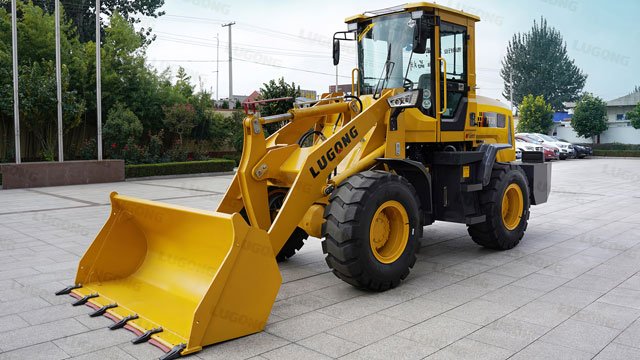Compact wheel loaders are essential pieces of equipment in construction, landscaping, and agriculture, known for their versatility and efficiency. However, like any machinery, they can encounter issues that affect their performance and reliability. Understanding these common problems and knowing how to address them can help ensure your compact wheel loader operates smoothly and remains productive. This blog will discuss some of the most common issues with compact wheel loaders and provide solutions to keep your equipment in top condition.
Hydraulic System Problems
The hydraulic system is crucial for the operation of a compact wheel loader, powering functions such as lifting, tilting, and steering. Hydraulic issues can significantly impact performance.
Common Hydraulic Issues
- Leaking Hydraulic Fluid: Hydraulic leaks can occur due to worn seals, damaged hoses, or loose fittings.
- Slow or Unresponsive Hydraulics: This issue can result from low hydraulic fluid levels, contaminated fluid, or clogged filters.
- Overheating: Overheating can be caused by excessive workload, low fluid levels, or a malfunctioning cooling system.
Solutions
- Inspect and Replace Seals and Hoses: Regularly inspect hydraulic hoses and seals for signs of wear and replace them as needed.
- Check Fluid Levels and Quality: Maintain proper hydraulic fluid levels and replace contaminated fluid. Regularly change hydraulic filters to prevent clogs.
- Monitor Cooling System: Ensure the cooling system is functioning correctly by checking the radiator, coolant levels, and fan operation. Clean any debris from the radiator to improve airflow.
Electrical System Issues
Electrical problems can cause various operational issues in a compact wheel loader, from starting difficulties to malfunctioning controls.
Common Electrical Issues
- Battery Problems: A weak or dead battery can prevent the loader from starting.
- Faulty Wiring: Damaged or corroded wiring can lead to intermittent electrical problems or complete system failures.
- Malfunctioning Sensors: Sensors that monitor critical systems can fail, leading to inaccurate readings or warning signals.
Solutions
- Inspect and Replace Batteries: Regularly check the battery for signs of wear, corrosion, or low charge. Replace the battery if necessary.
- Check and Repair Wiring: Inspect wiring for damage, wear, or corrosion. Repair or replace faulty wiring and connectors.
- Test and Replace Sensors: Use diagnostic tools to test sensors and replace any that are malfunctioning.
Engine Performance Issues
The engine is the heart of a compact wheel loader, and any performance issues can severely impact its efficiency and productivity.
Common Engine Issues
- Hard Starting: Difficulty starting the engine can be due to fuel system problems, a weak battery, or ignition issues.
- Loss of Power: This can be caused by fuel contamination, clogged air filters, or engine wear.
- Overheating: Engine overheating may result from cooling system failures, low coolant levels, or a faulty thermostat.
Solutions
- Maintain the Fuel System: Regularly inspect and replace fuel filters, and ensure the fuel is clean and free of contaminants.
- Clean or Replace Air Filters: Check air filters frequently and clean or replace them to ensure proper airflow to the engine.
- Monitor Cooling System: Check coolant levels, inspect hoses and radiators for leaks, and ensure the thermostat and water pump are functioning correctly.
Tire and Traction Issues
Tires are crucial for the stability and maneuverability of a compact wheel loader. Problems with tires can affect the loader’s performance and safety.
Common Tire Issues
- Flat or Damaged Tires: Punctures, cuts, or excessive wear can lead to flat or damaged tires.
- Poor Traction: Worn or inappropriate tires can result in poor traction, affecting the loader’s ability to operate on various surfaces.
Solutions
- Regularly Inspect Tires: Check tires for signs of wear, damage, or punctures. Replace tires as needed to maintain safety and performance.
- Choose the Right Tires: Select tires that are appropriate for the working conditions. Consider using specialized tires for specific terrains or tasks.
Mechanical Wear and Tear
Like all machinery, compact wheel loaders experience mechanical wear and tear over time. Regular maintenance is essential to prevent and address these issues.
Common Mechanical Issues
- Worn Bushings and Pins: These components can wear out due to heavy use, leading to increased play and reduced precision.
- Loose Bolts and Fasteners: Vibration and heavy use can cause bolts and fasteners to loosen over time.
Solutions
- Inspect and Replace Bushings and Pins: Regularly check these components for wear and replace them to maintain tight, precise operation.
- Tighten Bolts and Fasteners: Periodically inspect and tighten all bolts and fasteners to ensure the loader’s structural integrity.
Preventive Maintenance
The best way to address common issues with compact wheel loaders is through preventive maintenance. Regular maintenance can help identify and fix problems before they lead to significant downtime or costly repairs.
Maintenance Tips
- Follow Manufacturer’s Guidelines: Adhere to the maintenance schedule and guidelines provided by the manufacturer.
- Keep Detailed Records: Maintain records of all inspections, maintenance, and repairs. This helps track the loader’s condition and anticipate future maintenance needs.
- Train Operators: Ensure that operators are well-trained in proper use and maintenance practices. This can prevent many issues caused by improper handling.
Conclusion
Understanding and addressing common issues with compact wheel loaders can significantly extend their lifespan and improve their performance. Regular inspections, proper maintenance, and timely repairs are essential to keep your equipment in top condition. By following these guidelines, you can ensure that your compact wheel loader remains reliable and efficient, helping you complete your construction projects on time and within budget.




